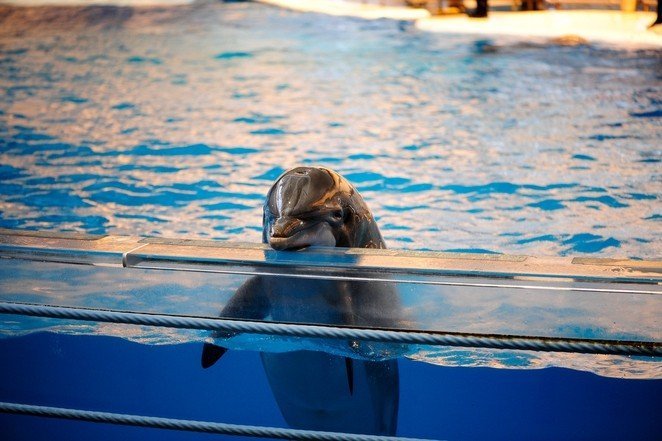
India’s Ministry of Environment and Forests have made a groundbreaking decision, to completely forbid the keeping of captive dolphins for public entertainment in the entire country.
A statement about their new police was released Friday, the ministry advised the state governments to deny any proposals that requested the establishment of a dolphinarium.
“by any person / persons, organizations, government agencies, private or public enterprises that involve import, the capture of cetacean species to establish for commercial entertainment, private or public exhibition and interaction purposes whatsoever.”
Why did the ministry come to this decision?
The ministry elaborated their first statement with these words,
“Whereas cetaceans, in general, are highly intelligent and sensitive, and various scientists who have researched dolphin behavior have suggested that the unusually high intelligence; as compared to other animals means that dolphins should be seen as ‘non-human persons’ and as such should have their own specific rights and is morally unacceptable to keep them captive for entertainment purpose,” the ministry said.
For some reason back in May, this wonderful topic managed to evade worldwide attention including the media’s. Since the meeting of the American Association for the Advancement of Science back in 2011, when a group consisting of conservationists, philosophers, and animal behaviorists attempted to gain world wide support for a Declaration of Rights for Cetaceans from the scientific communities, to ensure the re-categorization of Cetaceans (porpoises, whales, and dolphins) as nonhuman persons have been gathering strong momentum.
The Declaration is stated below:
- Every individual cetacean has the right to life.
- No cetacean should be held in captivity or servitude; be subject to cruel treatment; or be removed from their natural environment.
- All cetaceans have the right to freedom of movement and residence within their natural environment.
- No cetacean is the property of any State, corporation, human group or individual.
- Cetaceans have the right to the protection of their natural environment.
- Cetaceans have the right not to be subject to the disruption of their cultures.
- The rights, freedoms and norms set forth in this Declaration should be protected under international and domestic law.
You might be wondering what it means to say an animal has “rights”? Here is a quick description of what that looks like,
“Unlike[…] positive rights, such as the ‘right’ to education or health care, the animal right is, at the bottom, a right to be left alone. It does not call for the government to tax us in order to provide animals with food, shelter, and veterinary care. It only requires us to stop killing them and making them suffer.”
That seems more than reasonable enough right? Since the intelligence of dolphins has been established for quite some time this declaration really doesn’t seem to be a revolutionary move. These beings all show signs of not only to be self-aware but have the capability of using tools, cooperating to solve different tasks, and even more recently we have discovered that they may possibly be able tocommunicate to one another using individual names.
I believe that what this declaration does for the other sentient beings of the sea is that we are relinquishing our self-proclaimed right to become masters of other sentient beings that at some point were deemed below us. In a perfect world, we would not use the abilities that we have gained as human beings to subjugate other beings, whether it be animal human or plant. If we would just work together and live together as one, we would be able to solve most, if not all the issues of the world. I believe this declaration made by India, is surely a step in the right direction.
Sources-peacefulwarriors.net


